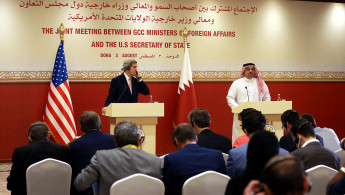Doha talks: Reassurances and agreements over Iran fears
The Qatari capital Doha became on Monday the capital of world diplomacy when it embraced a series of meetings that included some of the most prominent Western and Arab policy-makers in the world.
Many issues were discussed in successive meetings held by US Secretary of State John Kerry and his Russian counterpart Sergei Lavrov with the foreign ministers of the Gulf Cooperation Council (GCC) states and the Qatari Emir Tamim bin Hamad.
While Monday's talks touched on a range of topics including conflicts in Syria, Iraq, Yemen, and Libya, Kerry's main goal during the trip was to follow up on a May meeting that President Barack Obama hosted for Arab leaders at Camp David.
At that meeting, Obama promised Bahrain, Kuwait, Oman, Qatar, Saudi Arabia and the United Arab Emirates enhanced security cooperation and expedited defence sales to guard against potential Iranian threat.
Speaking for the GCC, Qatari Foreign Minister Khalid al-Attiyah said that the bloc had been impressed by Kerry's presentation of the agreement and explanations of how it will be verified and enforced.
"Consequently, the GCC countries have welcomed on this basis what has been displayed and what has been talked about by His Excellency Mr. Kerry," said al-Attiyah, whose nation currently chairs the group.
"He let us know that there is going to be live oversight over Iran," al- Attiyah said of Kerry's presentation. "This is reassuring to the region."
| He let us know that there is going to be live oversight over Iran Qatari Foreign Minister Khalid al-Attiyah |
Kerry had come to Doha seeking to ease such fears and said the US would continue to expand security cooperation with the Gulf countries to counter any destabilising activities from Iran or others.
"Once fully implemented, the [Iran deal] contributes to the region's long-term security, including by preventing Iran from developing a military nuclear capability," Kerry said, reading from a joint US-GCC statement.
He said that the nuclear deal might or might not affect Iran's behaviour but that the US and its allies must plan as if it would not.
Among the steps under discussion were developing a ballistic missile defence capability, expediting arms transfers, special force training, maritime and cyber security programs and a significant boost in intelligence sharing, Kerry said. Working groups on those issues will begin meeting next week in Saudi Arabia, he added.
All of those are part of a package of programs that he said would build "stronger and more enduring strategic partnership with particular focus on counterterrorism and countering the destabilising activities taking place in the region," he said.
Kerry met separately with Lavrov and Saudi Foreign Minister Adel al-Jubeir to discuss Syria and other regional issues. The three-way meeting is unusual, because Russia has backed Syrian President Bashar Assad, while Saudi Arabia and the United States have called for his removal.
Lavrov gave no indication to reporters after the meeting that Moscow was preparing to shift its support for Assad as he called for dialogue between opposition groups and Assad's government.
Although he met during his trip with Mouaz al-Khatib, the former president of the Syrian National Coalition opposition group, he denied the meeting marked a shift in policy.
Lavrov also held talks with Hamas leader Khaled Mashaal, who lives in exile in Qatar. The two leaders had met previously in Russia, in 2007 and 2010.
In his speech, the Qatari foreign minister called on Washington to make more effort to bring a comprehensive Palestinian-Israeli peace process back on track and end the occupation, in accordance with international resolutions and the Arab initiative.
He also emphasised the keenness of the GCC on the unity of Yemen, its territorial integrity, respecting its sovereignty, supporting legitimacy, and completing the political process, in accordance with the Gulf initiative and its mechanisms, the national dialogue, the Riyadh Declaration, and the relevant UN Security Council resolutions.




 Follow the Middle East's top stories in English at The New Arab on Google News
Follow the Middle East's top stories in English at The New Arab on Google News

![A group of Palestinians, foreign and Israeli activists gather to participated in an olive picking event on the land in the town of Battir, which is under threat of confiscation by Israel in Bethlehem, occupied West Bank on 8 November 2024. [Getty]](/sites/default/files/styles/image_330x185/public/2182930803.jpeg?h=199d8c1f&itok=__0LgGsa)
